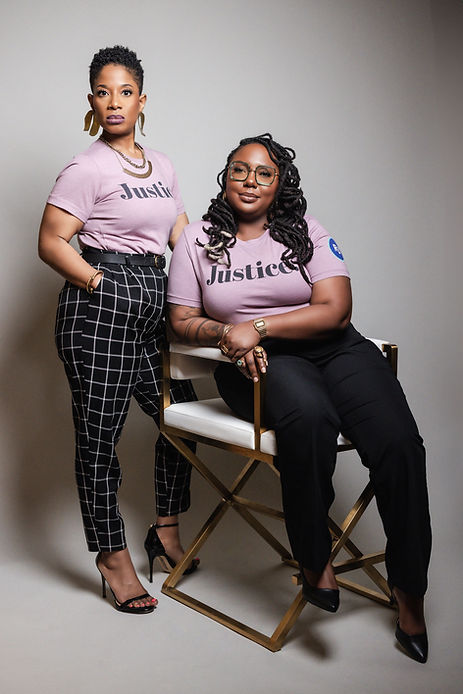


about

Origin Story
The vision of RJ Squared, LLC was born during a post- meeting conference room conversation between Rebecca Severin and Jasmine Getrouw. At the time Rebecca and Jasmine were frequently having deep conversations about the state of Black Maternal Health and the pitfalls in strategies being supported by organizations that consistently missed the mark in improving conditions for people of reproductive age.
They identified that there was too much focus centered on fixing individuals based on stereotypical tropes, not enough assessment done on systems and institutions, and a severe lack of understanding of the historical context in colonized, white supremacist, patriarchal, capitalistic societies. As Black women working in Public Health, specifically Maternal Health, we were able to see first hand the ways good intentions were not enough to combat institutional harm and systemic racism.

Rebecca and Jasmine identified the way to uproot bias and racism in US institutions is through a plethora of tools that include understanding the historical analysis that created the current societal conditions; examining the connection to those beliefs that still exist using a Reproductive Justice framework; continued retrospective mindfulness practice to shift culture; and analyzing and modifying policies, procedures and practices with the most marginalized in mind.
The first RJ in the unique name stands for “Reproductive Justice;” as defined by Sister Song, Reproductive Justice is the human right to maintain personal bodily autonomy, have children, not have children, and parent the children we have in safe and sustainable communities. RJ2 centers the Reproductive Justice Framework in the form of technical assistance, programmatic assessment and consulting provided to organizations.
The second RJ in the name represents the founders, Rebecca and Jasmine. After aligning their passion for anti-racist work, root-cause analysis of racial injustices and a desire to see an elimination of harm so consistently perpetuated in programing for marginalized communities, Rebecca and Jasmine created RJ Squared, LLC.
Mission Statement
To eliminate the harm caused by the structural determinants of health in historically marginalized communities through the adaptation of the Reproductive Justice Framework in advancing equitable policies and practices.
Vision Statement
Co- construct joy-filled communities where Black, Indigenous, Persons of Color residents can participate in abundant living experiences and achieve their desired lifestyle.
Rebecca A. Serverin
MPH, CPH, Operations Director
Rebecca is an experienced facilitator, consultant, and systems analyst. She has spent the last 13 years leading federal and state programs related to maternal and infant health. Rebecca has a background in program implementation, program management, reflective supervision, coaching, motivational interviewing, quality improvement and Results Based Accountability framework. Rebecca is passionate about examining the roots of racial inequities, helping individuals and teams discover innovative solutions, and strategic planning.
If you are silent about your pain, they’ll kill you and say you enjoyed it.
Zora Neale Hurston


Jasmine Getrouw
MPA, Executive Director
Jasmine is an experienced antiracism centered, equity focused strategist and facilitator. She encompasses innovative approaches for expanding equity across the lifespan. Jasmine uses a root cause analysis through an intersectional, antiracist lens. Jasmine’s toolbox, developed by her roots in community health education, includes performing needs assessments; planning interventions, implementation; and the evaluation of programs, which both reduce disparities in marginalized populations and address implicit bias within our sociopolitical context. Jasmine is dedicated to developing effective strategies for addressing the structural inequities that have historically and disproportionately affected communities.
The far more difficult question we must collectively engage has to do with the political positions (in the widest sense) that we come to practice, not merely espouse; the mutual frameworks we adopt, as we live (both consciously and unconsciously) our daily lives. No matter our countries of origin, decolonization is a project for all.
M. Jacqui Alexander
Valued Partnershsips












